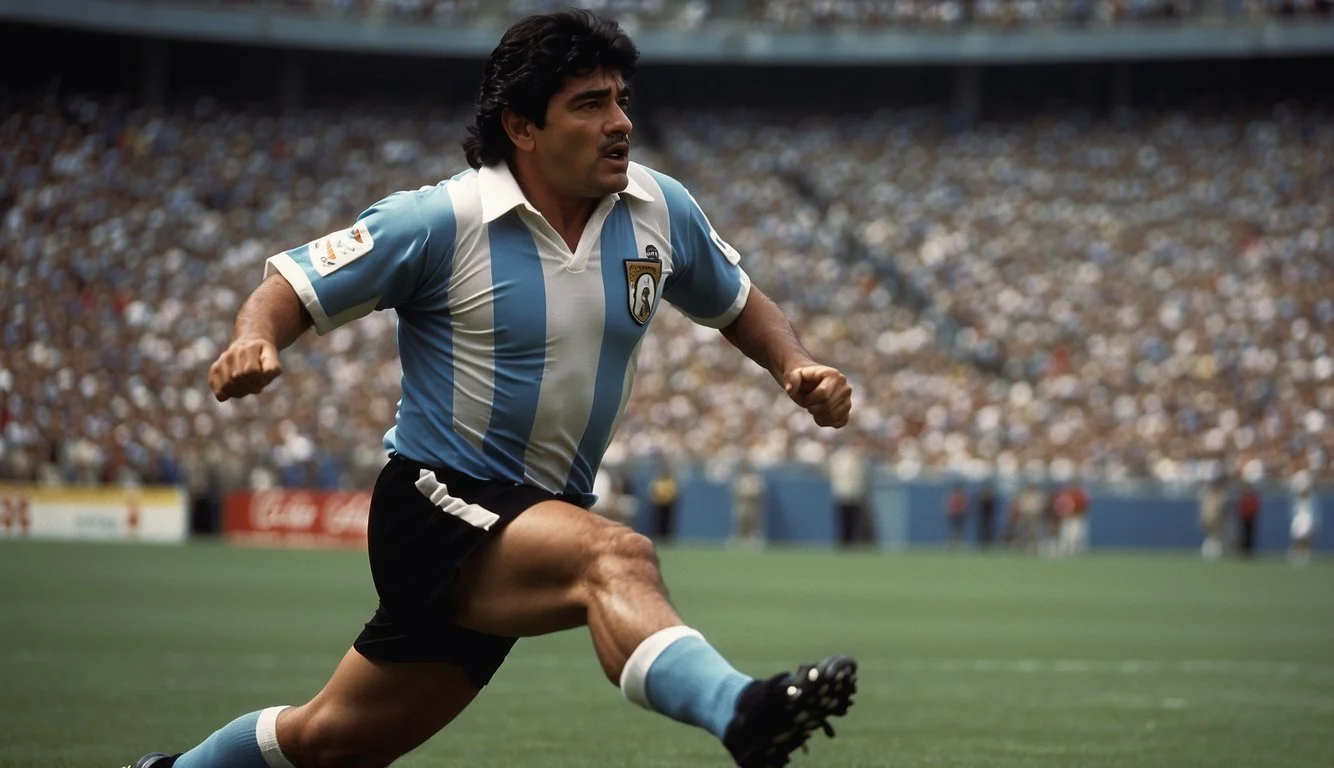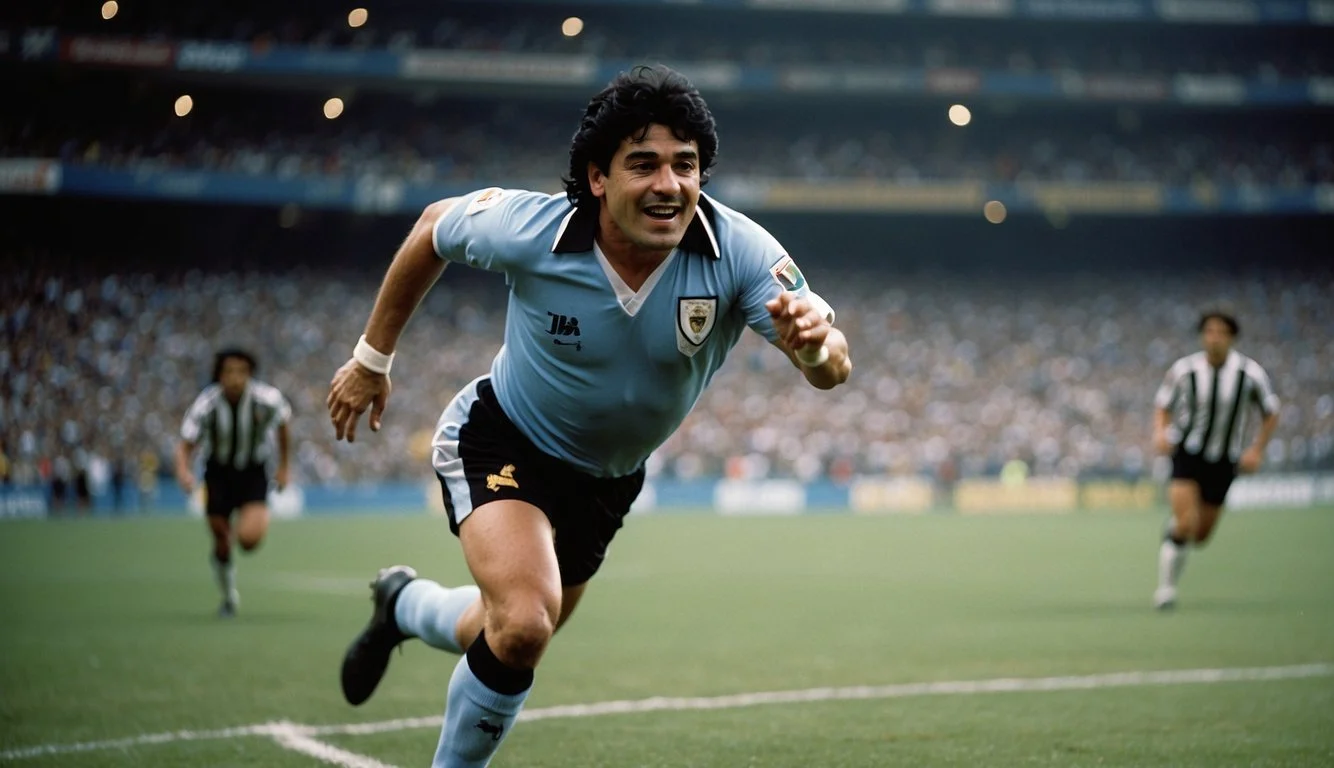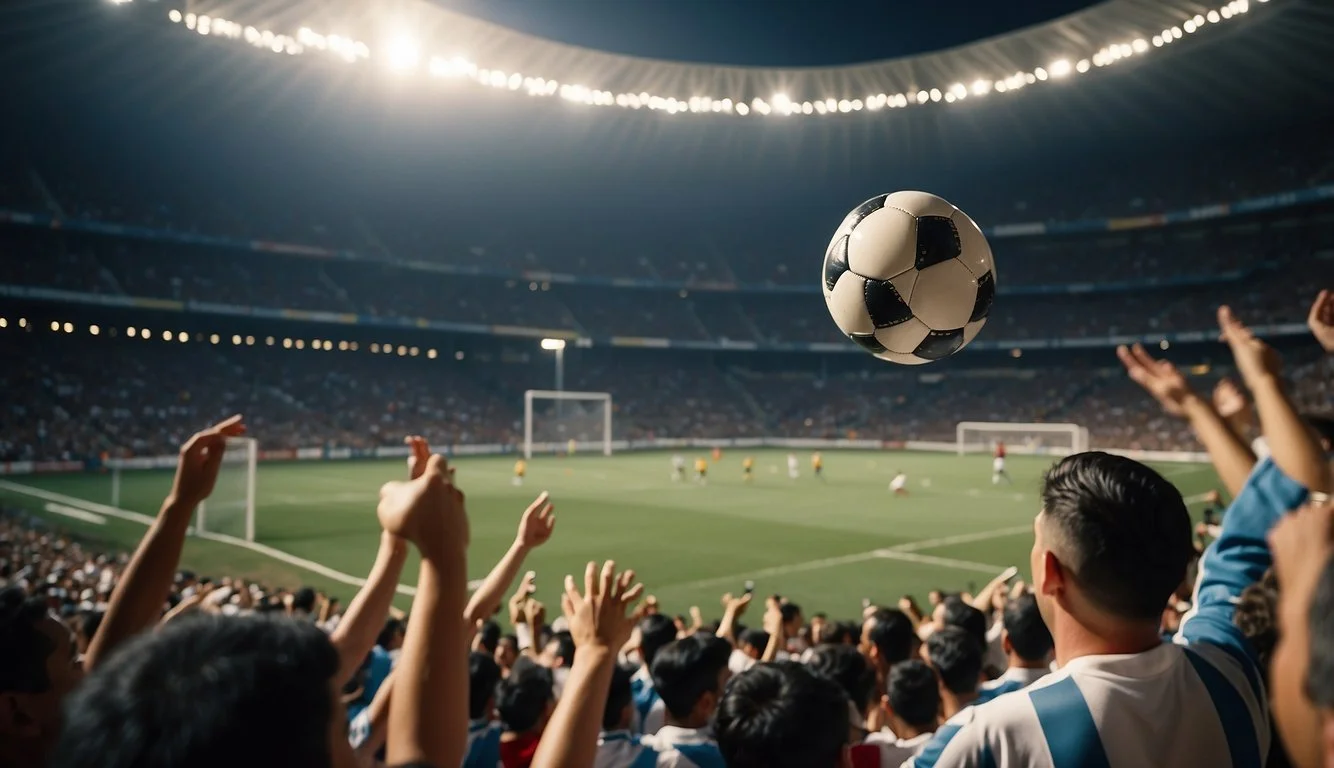Documentary Review: Diego Maradona (2019)
A Deep Dive into the Football Legend
"Diego Maradona" (2019) is an intimate and compelling documentary exploring the complex life of one of soccer's most legendary and controversial figures. Directed by Asif Kapadia, the film uses over 500 hours of archival footage to paint a vivid picture of Maradona's rise from a shanty town in Buenos Aires to global superstardom. The documentary focuses particularly on his years playing in Italy, showcasing both his extraordinary skills and the personal challenges he faced.
Viewers see multiple facets of Maradona's life, including his devotion to his family and his struggle with fame. The film skillfully captures the dichotomy of a man revered on the soccer field but troubled off it. This approach provides a balanced view that both celebrates his achievements and scrutinizes his darker moments, making it a must-watch for fans and newcomers alike.
Maradona's story is not just about soccer; it is also a tale of resilience and the harsh light of fame. His journey resonates with anyone interested in the highs and lows of a public figure's life, making this documentary more than a sports movie—it’s a profound human story.
Overview of 'Diego Maradona' Documentary
The documentary "Diego Maradona" provides a deep dive into the life of one of soccer's most tantalizing figures, focusing on his career in Italy and the complexities of his personal life. The film masterfully combines archival footage with expert direction.
Director and Production
Directed by Asif Kapadia, the documentary leverages Kapadia's unique storytelling expertise. Known for "Senna" and "Amy," he focuses on the Italian chapter of Maradona's career.
The production involved sifting through over 500 hours of archival footage, uncovering multiple facets of Maradona's personality. Collaborators included On the Corner Films and Lorton Entertainment.
Kapadia’s approach allows viewers to see Maradona as a multi-dimensional character, placing equal emphasis on his triumphs and controversies.
Release and Reception
Released in 2019, the film received critical acclaim for its detailed portrayal and engaging narrative.
Critics praised how the film avoided romanticizing Maradona, instead presenting a nuanced picture of his life. The Los Angeles Times highlighted its expert storytelling, while Common Sense Media noted its focus on his time in Italy.
Audiences appreciated the intimate look at Maradona, from his early success to his struggles, achieving a solid rating on various review platforms.
Diego Maradona: The Icon
Diego Maradona, the Argentine football legend, evolved from a young boy in a shantytown to one of the most electrifying and controversial figures in sports history. His journey is marked by phenomenal soccer skills and turbulence on and off the field.
Early Life and Career
Born in 1960 in Villa Fiorito, a slum outside Buenos Aires, Maradona grew up in poverty. Despite the challenging conditions, his talent in soccer became apparent early on. By age 15, he debuted for Argentinos Juniors, quickly becoming indispensable due to his exceptional dribbling and creativity.
His playstyle caught the eye of Boca Juniors, where he moved in 1981. There, Maradona secured his first league title, laying the groundwork for his future stardom. His early career was a mix of personal ambition and a drive to support his family, a recurring theme throughout his life.
Rise to Stardom
Maradona's move to FC Barcelona in 1982 marked the beginning of his rise to international fame. Though plagued by injuries and disciplinary issues, he showcased his brilliance, including a memorable solo goal in El Clásico against Real Madrid.
However, it was his transfer to Napoli in 1984 that truly cemented his status. He led the club to its first-ever Serie A title, transforming Napoli into a formidable force. His leadership and skill on the field made him a hero in Italy, particularly in the underprivileged southern regions.
Maradona's peak arguably came during the 1986 World Cup in Mexico. His "Hand of God" goal and the masterful "Goal of the Century" against England exemplified both his controversial and genius sides. These moments solidified his legacy as one of the greatest football players of all time.
The Craft of Storytelling
The documentary Diego Maradona masterfully showcases the complex life of the soccer legend through meticulous storytelling. It utilizes compelling narrative structure, visually rich cinematography, and precise editing to captivate the audience.
Narrative Structure
Director Asif Kapadia employs a well-crafted narrative structure in Diego Maradona. The documentary unfolds chronologically, starting with Maradona’s humble beginnings in a shanty town outside Buenos Aires. It then delves into his rise to international fame and examines the challenges he faced along the way.
The film captures both the public and private sides of Maradona, effectively balancing his professional achievements with personal struggles. Key milestones, such as his pivotal play in the 1986 World Cup, are highlighted to illustrate his impact on soccer and culture. Through interviews and archival footage, the story is presented in a coherent and engaging manner, making the audience feel intimately connected to Maradona’s journey.
Cinematography and Visual Style
The cinematography in Diego Maradona is both dynamic and intimate. Archival footage from the 1980s and 1990s is meticulously curated to give an authentic feel of Maradona’s life and times. The visual style tends to focus on contrasting Maradona’s glamorous public persona with the grit of his private life.
The use of handheld cameras and close-up shots allows the viewer to experience the raw emotions and intensity of Maradona’s experiences. This technique effectively contrasts the grandeur of stadiums filled with cheering fans with quieter, more introspective moments. The visual storytelling is enhanced by the careful selection of scenes that convey the highs and lows of Maradona’s career, making the narrative visually engaging.
Editing and Pacing
Editing plays a crucial role in maintaining the documentary’s engaging pace. Kapadia and his team sifted through over 500 hours of footage to create a compelling, coherent story. The editing ensures that the narrative flows smoothly, with transitions that seamlessly connect different phases of Maradona’s life.
The pacing is adeptly managed, keeping the audience invested without feeling rushed or drawn out. Key moments are given the time they deserve, while less critical sections are concisely presented. The interweaving of interviews and archival footage maintains a rhythm that aligns with the emotional peaks and valleys of the story, ensuring a consistently engaging experience for the viewer.
Themes and Interpretations
The documentary "Diego Maradona (2019)" expertly covers key themes such as the interplay between fame and personal struggles, the significance of football in shaping national identity, and the controversy intertwined with Maradona's legacy.
Fame and Personal Struggles
Diego Maradona rose from humble beginnings to international stardom, becoming one of the greatest soccer players of all time. The documentary highlights his journey from a shanty town near Buenos Aires to the heights of fame. Fame, however, brought enormous pressure and personal challenges. It portrays the dichotomy between his public persona and private battles, including issues with substance abuse and personal relationships. Archival footage reveals Maradona's constant struggle to balance his dedication to family and the demands of his career.
Football and National Identity
Football served as a unifying force for Argentina, with Maradona at its heart. His talent on the field was a source of national pride, particularly during the 1986 World Cup. The documentary underscores how his performances transcended sport, becoming symbols of national strength and identity. In Italy, his time at Napoli further solidified his role as a cultural icon, where his success on the pitch uplifted a city known for economic hardship. These moments in his career were pivotal in shaping and reflecting the collective identity of fans.
Controversy and Legacy
Maradona's life was marked by significant controversy, integral to his legacy. The film doesn't shy away from addressing his well-documented issues with drugs, his flamboyant lifestyle, and clashes with media and sports officials. This complex portrayal adds depth, showing him as both a hero and a flawed human being. His controversial moments, like the "Hand of God" goal, become critical talking points, adding to the mystique and ongoing debate surrounding his place in football history. This nuanced legacy continues to spark discussions among fans and critics alike.
Key Events Portrayed in the Film
The documentary, Diego Maradona, illuminates pivotal moments in the renowned soccer player's career, particularly his World Cup achievements and successes with Napoli in Italy.
World Cup Triumphs and Challenges
Maradona's journey in the World Cup showcases both his extraordinary skills and the significant obstacles he faced. One of the most memorable events captured is the 1986 World Cup in Mexico, where Maradona led Argentina to victory.
His performance in the quarterfinal against England included the infamous "Hand of God" goal, followed by a dazzling solo effort known as the "Goal of the Century." These moments highlight his genius, but also the controversies that followed him. Subsequent World Cups saw Maradona continuing to influence games, although he faced increasing scrutiny and pressure, both from the media and international soccer bodies.
Napoli Success and Life in Italy
Maradona's tenure with Napoli in the mid-to-late 1980s marked a golden era for the club. Arriving in 1984, he transformed Napoli into a competitive force in Serie A. Under his leadership, Napoli won their first-ever Serie A title in the 1986-87 season, and then again in 1989-90.
Maradona's impact extended beyond the pitch, as he became an iconic figure in Naples, adored by fans for bringing success to a historically underperforming team. However, his time in Italy was also marked by off-field issues, including allegations of drug use and associations with local crime figures. These elements add depth to his story, showing both his brilliance and the darker aspects of fame.
Critical Analysis
The documentary "Diego Maradona" (2019) directed by Asif Kapadia, provides an intricate exploration of Maradona's life, particularly focusing on his complexities as a public figure and his impact on soccer. The film excels in both documentary filmmaking and historical accuracy.
Achievements in Documentary Filmmaking
Asif Kapadia, known for his works on flawed geniuses, deftly curates over 500 hours of archival footage. His narrative technique immerses viewers into the chaotic and vibrant world of Maradona.
Kapadia’s storytelling balances Maradona’s soccer brilliance with his personal demons. The editing is concise, ensuring the film remains compelling without feeling overwhelming. The choice of intimate, unpolished footage adds authenticity, capturing Maradona in vulnerable moments, which humanizes the legend.
Moreover, the film strikes a balance between exposition and emotional engagement. The candid interviews with those close to Maradona further enrich the narrative, providing varied perspectives on his turbulent journey.
Historical Accuracy and Perspective
The documentary meticulously outlines key phases of Maradona’s career, from his early days in Buenos Aires to his controversial tenure at Napoli. The film does not shy away from the darker aspects of his life, including his struggles with addiction and the fallout from his stardom.
Kapadia ensures historical events are contextualized with relevant socio-political backdrops. This includes the economic situation in Argentina and the cultural landscape of Italy during the 1980s and 90s.
Through these layers, the documentary provides a nuanced view of Maradona, avoiding either excessive glorification or undue criticism. By relying extensively on archival footage and contemporary interviews, Kapadia offers an authentic representation free from modern reinterpretation.
In essence, the documentary's commitment to precision enhances its credibility, making it a vital resource for those looking to understand both the man and the myth.
The Impact of 'Diego Maradona'
Diego Maradona's documentary delves into the cultural and football landscape, synthesizing the legend's influence on both fields, sparking widespread discussions and debates that continue today.
On Modern Culture and Football
The documentary highlights Diego Maradona's profound impact on modern culture and football. Maradona transcended his role as a sports figure, becoming an icon whose fame stretched far beyond the football pitch. His unique flair, extraordinary talent, and charismatic personality captivated millions, influencing a generation of football fans and players alike.
Maradona's time in Italy with Napoli, as depicted in the film, illustrates his role in transforming a struggling football club into a powerhouse. His influence extended to introducing new playing styles and elevating the team's status in international competitions. The documentary captures these pivotal moments, showing how Maradona's legacy reshaped modern football and left a lasting mark on the sport's cultural narrative.
Discussions and Debates Sparked
"Diego Maradona" has sparked extensive discussions and debates, reflecting the complexity of his life and career. The documentary does not shy away from controversies, highlighting Maradona's struggles with addiction and tumultuous personal life alongside his professional triumphs.
These revelations have prompted discussions on the pressures faced by elite athletes, the role of media in shaping public perception, and the support systems available for them. Furthermore, Maradona's dual identity as both a hero and a flawed individual invites debates on the nature of celebrity and the burden of expectation placed on sports icons.
The film serves as a catalyst for conversations about ethics in sports, the influence of sports personalities on societal values, and the balance between personal challenges and public adoration.
Director's Commentary and Bonus Features
Asif Kapadia's "Diego Maradona" unveils a wealth of supplemental content that enriches the viewing experience. This includes insightful interviews and exclusive behind-the-scenes glimpses, along with compelling deleted scenes and other extras.
Interviews and Behind-the-Scenes
Kapadia’s documentary shines with in-depth interviews featuring those closest to Maradona. These include family members, former teammates, and journalists who covered his career. Their perspectives provide a multifaceted view of Maradona's personal life and professional journey.
Behind-the-scenes footage offers a rare look at the film-making process. Viewers witness how over 500 hours of archival footage were meticulously assembled. This not only showcases the director's dedication but also enhances appreciation for the narrative construction.
Deleted Scenes and Extras
The deleted scenes in "Diego Maradona" are essential viewing for fans and critics alike. These scenes, cut for time or narrative flow, often include intriguing moments that amplify the main story. They give additional context and highlight lesser-known aspects of Maradona's life.
Bonus features might include extended interviews, uncut action sequences, and exclusive footage from pivotal matches. These extras serve to deepen engagement with Maradona's legacy and offer fans more content to enjoy and analyze.
Conclusion and Final Thoughts
Asif Kapadia's "Diego Maradona" offers a comprehensive exploration of one of soccer's most enigmatic figures. Utilizing over 500 hours of archival footage, the documentary captures the multifaceted life of Maradona, from his origins in a Buenos Aires shantytown to his rise as a global superstar.
The film presents Maradona as both a devoted family man and a figure caught in the throes of fame and controversy. Viewers witness his transformation from a humble teenager to a cultural icon who embraced a life of excess.
Highlights:
Archival Footage: The use of rare and extensive videotape from the 1980s and 1990s adds authenticity.
Personal Insights: The documentary delves into Maradona's personal struggles and triumphs, painting a holistic picture.
Themes:
Rise and Fall: The film expertly charts Maradona's career highs and lows.
Cultural Impact: It examines his influence on sports and society, shedding light on why he remains such a compelling figure.
Kapadia's narrative style remains true to his previous works like "Amy" and "Senna," preserving the integrity of Maradona's story. The documentary succeeds in portraying a legend whose life was as spectacular as it was tragic.





